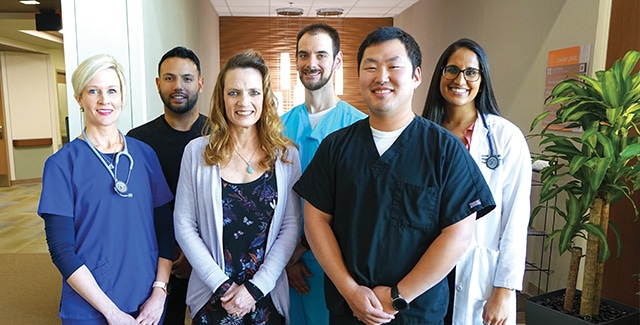Meet Your Interdisciplinary Team

Madonna’s Approach to Care
At Madonna, we recognize the unique needs of each patient that comes through our doors. We have dedicated rehabilitation teams made up of a wide variety of clinicians, each with different roles and areas of expertise and training, to meet the needs of patients recovering from a serious injury or illness. Teams meet regularly to help create a customized plan for each patient, set goals and share knowledge across disciplines. Our teams are relentlessly committed to staying on the cutting edge of innovation, research and new techniques to benefit our patients.
Your Interdisciplinary Team
Hospitalist
Patients are seen daily by a hospitalist who is a board-certified internal medicine practitioner.
Physiatrist
A physiatrist, also known as a Physical Medicine and Rehabilitation (PM&R) physician, specializes in the rehabilitative treatment and management of disease and injury affecting the brain, spinal cord, nerves, bones, joints, ligaments, muscles and tendons. The primary focus is to restore function and promote overall health.
Neuropsychology
The neuropsychologist measures a patient’s thinking skills, like memory and problem-solving, to help maximize a patient’s recovery. A neuropsychologist may need to help a patient understand their injury and determine ways to overcome limitations.
Certified Rehabilitation Registered Nurse
The rehabilitation registered nurse is specifically trained to provide higher-level nursing care to patients with physical disabilities recovering from an accident or injury.
Physical Therapists
A physical therapist (PT) works with patients to regain mobility skills like walking, balancing, sitting and standing.
Occupational Therapists
An occupational therapist (OT) helps patients develop the skills necessary to transition back home. These skills include dressing, bathing, toileting and eating, as well as homemaking and community skills. The OT works with arm and shoulder strengthening, vision changes and higher-level thinking skills such as problem-solving tasks, and job-related skills.
Speech Language Pathologists
Speech-language pathologists (SLP) work with patients on speaking, understanding, and learning. They also assess the patient’s ability to eat and swallow.
Recreation Therapist
A recreation therapist uses play strategically with patients to regain physical or mental skills. The recreation therapist can also help a patient return to life more fully by returning to a sport or hobby or finding a new one.
Case Manager
The case manager coordinates all of the options and services a patient may need during recovery. The case manager is an advocate, communicator, and resource manager promoting high-quality and cost-effective interventions.
Social Worker
The social worker ensures that patient rights are upheld and that patients are involved in their treatment plans. They meet with the patient and family regularly to help ensure a smooth transition home.
Spiritual Care Professional
Mission Services provides spiritual and religious support by offering daily Catholic Mass and regular non-denominational services for patients and patient families. A spiritual care specialist visits regularly with every patient to offer pastoral counseling.
Respiratory Therapist
The respiratory therapist provides specialized care for patients with difficulty breathing following illness or injury and works with the team to wean the individual from a ventilator and/or tracheotomy.
Nutrition Therapist
When a patient arrives at Madonna, a nutritional therapist assesses his or her diet history and food preferences. Throughout a patient’s recovery, the nutritional therapist monitors his or her diet to help maintain a healthy weight and energy level.
Education Specialist
The education specialist is the liaison between a pediatric patient’s rehabilitation team and their school. To ensure a smooth transition back to school, the education specialist meets with the child’s teachers, special educators, and families to build educational strategies and plan for any classroom adaptations.
Pharmacist
A pharmacist provides ongoing medication review and tracks all the medications prescribed for patients during their stay.
Family Members
Families are encouraged to identify at least one person to receive structured training on how to interact with and care for their loved one. Research shows that patients whose families are actively involved in their recovery have better outcomes.
Palliative Care Provider
Palliative care is for adults and children with serious illnesses that focuses on relieving suffering and improving the quality of life for patients and their families but is not intended to cure the disease itself. It provides relief from symptoms, pain and stress of illness for both the patient and the family.




